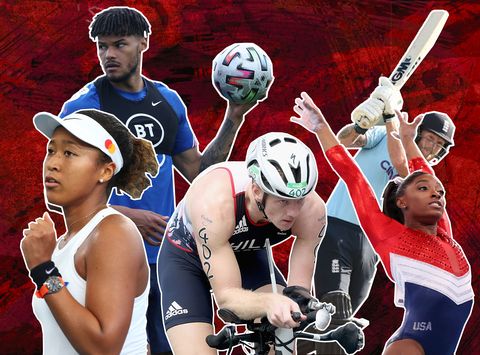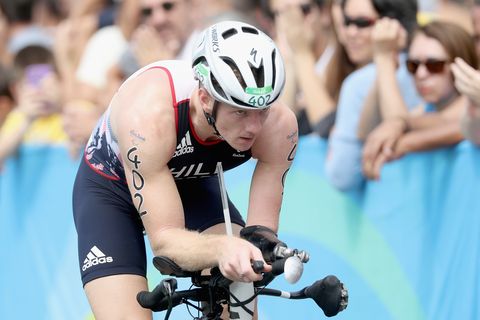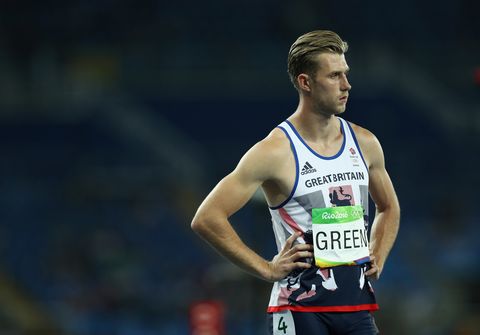Earlier this year, when Tokyo 2020 was at its height and the competition was in full swing, Simone Biles, the 24-year-old US artistic gymnast and medal favourite, announced she was dropping out of competition. Physically she was able to compete, but mentally Biles had deteriorated to the point that she couldn’t guarantee her own safety while performing the dizzying manoeuvres with which she made her name, so she stepped away from the sport to rebuild her mental health.
While the sporting world scratched its head and wondered if and when Biles would be back, she quietly retreated to a gym on the edge of Tokyo and worked on honing the basics. When she returned, just in time for her final event, she took home a bronze medal. It wasn’t quite the golden haul Biles’ coaches were likely hoping for, but she achieved something more important. She showed that a young athlete on the world stage could step away from a high-pressure situation and prioritise Simone Biles the person, not just Simone Biles the athlete.
“The Olympics was not how I expected it to go, but putting my mental and my physical health first will probably be one of my greatest accomplishments,” Biles said. And she’s right; already a role model to many, Biles stance has re-enforced what her generation already know and what the rest of us are learning: that mental and physical wellbeing should always come first, whatever the stakes.
Time magazine has claimed that the Tokyo Olympics has “changed the conversation about athletes’ mental health“, citing Jessica Bartley, a psychologist and the director of mental health services for the U.S. Olympic and Paralympic Committee. Bartley said her team received around ten requests per day to support athletes’ mental health needs, mostly in the form of anonymous tips, which told of athletes battling everything from quarantine issues to fears of not performing to the best of their abilities. In other words, combine the biggest sporting event in the world with the pressures of a global pandemic and it’s no surprise so many athletes have suffered.
Following Biles decision and that of the world’s number one tennis player Naomi Osaka to step away from post-match interviews to protect her own mental health earlier this year, more and more high-profile athletes are opening up about their own mental health. England cricketer Ben Stokes recently announced he would miss the India Test series to take an “indefinite break from cricket” in order to prioritise his mental health – a decision echoed by the month-long mental health break British gold medal-winning swimmer Adam Peaty is now taking after his Tokyo 2020 efforts. Likewise, Aston Villa’s Tyrone Mings has revealed he sought the help of a psychologist before Euro 2020 to stop outside influences affecting his performances. “When 90-95% of your country are having doubts over you, it’s very difficult to stop that intruding on your own thoughts,” Mings told The Sun. “So I did a lot of work on that with my psychologist. It was hard. I didn’t really sleep very well before that first game.”
Predictably, not everyone has been supportive of athletes putting their own health before duties to their team or country. An article in the Herald Scotland bemoaned the “cotton wool culture which will suffocate sport”, opining that the Olympics has become “infected” with a “snowflake sensibility.” Meanwhile, an article on the website Spiked ran with the title ‘Simone Biles and the problem with self-care’.
Peaty has spoken of being “disappointed” at the backlash around his decision. “Reading some of the comments in response to this is why we have such a stigma around mental wellbeing in sport. It isn’t a normal job. There is a huge amount of pressure,” he said. “I’m taking a break because I’ve been going extremely hard for as long as I can remember…Unfortunately there are people out there who think they know you more than you know yourself.”
Colin Preece, a chartered psychologist and an associate fellow of the British Psychological Society, who has worked with British shooting, British swimming and the British Paralympic team and now works with Help for Heroes in its ‘Hidden Wounds’ team, explains that the huge amount of pressure high-profile athletes face can often be too much. Especially when combined with unprecedented life pressures, such as the Covid 19 pandemic.
“Individuals can view competitions as challenges or threats,” he says. “The pressures of modern-day life for us all are intense. The Covid pandemic seems to have magnified this for many people. Major sporting competitions add another level of stress and perceived pressure. Our athletes just reflect what is happening in society for us all. The fact that they are prepared to speak out is a testament to how things are improving. Mental health is a topic that needs to be discussed openly and addressed for the benefit of us all.”
Preece goes on to argue that the world in which modern athletes operate is constantly evolving, so athletes being more open with their mental health is simply a logical response.
“The nature of competitive sport has changed over the years,” he says. “Social media, global television coverage and in some sports, enormous financial benefits, all play a role in increasing perceived pressure for modern competitors. However, mental health has always been an issue just perhaps not a recognised one. When we look back, we can identify sports people who have suffered in this area over the years and received little support.”
Despite this, there still exists a worrying sentiment that sportspeople are paid to play, whatever the situation – that stress naturally comes with the territory and should be taken in one’s stride. Then there’s the idea that stress isn’t a ‘real’ mental health issue. Former Leeds United footballer Danny Mills criticised Tyrone Mings on TalkSport, “If you’re going to come out and say it’s effecting your mental health every time somebody doubts you then it’s damaging for people with real mental health problems.”
The distinction between what is a ‘real’ mental health problem and what isn’t is of course, ludicrous. If an athlete feels overwhelmed by their feelings, that’s a problem that has to be addressed, whatever the diagnosis. Ignoring these feelings only leads to further problems.
That’s the experience of two-time Paralympian in swimming and triathlon, David Hill anyway. After a rocky year in 2012 Hill says he ignored his mental health until it built up and could no longer be ignored. “I was on the pathway to compete in the Rio 2016 Paralympics when my mental health was impacting my career to the point that I had no option other than to put my hand up for help,” he says. “When a competition doesn’t go to plan, it can feel like your whole world comes crashing down. All too often being an athlete is your whole identity. The attitude in sport is ‘faster, higher, stronger’ which doesn’t allow room for rest, kindness and reflecting.”
Luckily, Hill was able to get the help he needed and cites rest and recovery as key factors. “Recovery and adaptation don’t get enough publicity, yet we know that that is the most beneficial part of training and when growth and repair actually takes place,” he says. The emphasis, Hill believes, should now be on training coaches and support staff in order to provide better mental health support for athletes.
Not all mental health challenges in sport are allowed to fester until they become unmanageable. One success story is that of Matthew Blair, a footballer currently playing for Cheltenham Town. His story illustrates the damage that a keep calm and carry on attitude can have, but also, crucially, the benefits that an understanding team can bestow. “I was very unaware my mental health was an issue,” he says. “The football industry was very much of the mindset get on with it. By the time I realised my problems were more than just fatigue it was probably too late; it took me fainting to realise the issue.”
Still, Blair was unwilling to take time off until his then manager Darren Ferguson insisted. “As a player you always want to be training and playing games. If it wasn’t for my manager, his staff and my teammate basically telling me to take time off I never would have. Darren Ferguson told me he would not play me until I returned back from a week holiday with my family.” Blair followed his manager’s advice and came back “fitter, healthier, and with a better understanding of why mental health matters.”
This content is imported from Instagram. You may be able to find the same content in another format, or you may be able to find more information, at their web site.
Paul Greeves, an international performance coach and senior lecturer in sport coaching at Sheffield Hallam University understands just why support from a coach is so important. “The nature of coaching is to enable someone to reach their personal potential, so when that doesn’t happen you really feel for them,” he says. “High-performance athletes and players dedicate their lives to their sport and make a lot of personal sacrifices, whereas a member of the public might think it’s just a sport or competition. To the players and athletes it’s a huge part of their lives.”
As for what is happening now with the likes of Biles, Peaty and Mings opening up the conversation, Dr Josephine Perry, sport psychologist and author of Performing Under Pressure: Psychological Strategies for Sporting Success believes this stress is nothing new, we’re simply at a point culturally where athletes feel able to take a chance and speak out.
“I imagine in previous Olympics we have seen athletes pull out but offer reasons related to physical health instead,” Perry explains, again citing the Covid pandemic as an accelerator adding extra pressure to an already tense situation. Crucially, Perry stresses that for athletes like Biles or Peaty it isn’t about not having the guts to push through, but simply that they had no other choice but to step back. “I would suggest that for elite athletes it is never an excuse,” she says.
Of course, not all athletes find it as easy to take time off. Jack Green is a double Olympian who represented the UK while dealing with depression, anxiety and bipolar tendencies. His new book An Olympian’s Guide To Workplace Wellness hopes to share some of his insights.
“It was always difficult to step back and take time for myself because sport is a lifestyle rather than a 9-to-5 job,” he says. “Measuring myself via sporting results became an addiction, and for a long time my self-worth was attached to outcomes. The way I saw it was if I ran fast, I was a good person, and if I didn’t, I was bad. No one hurts more than an athlete who doesn’t achieve or perform to their best. If you view it as a failure rather than a learning experience, then you are full of shame and embarrassment that is only exacerbated by being in the public eye.”
Green believes a stigma still exists around athletes’ mental health simply because we (literally) place them on pedestals. When we hold them up as perfect physical specimens, it isn’t surprising that we expect their minds to be equally as honed. “This stigma [around mental health] is even stronger in sport, from the idea of being a superhero and on a pedestal to the language that is predominantly used, which is all around conflict and aggression.”
He too has called for more education around mental health awareness in sport for athletes, coaches and support staff. “I also believe we need to help athletes develop themselves outside of their sporting environment,” he says. “To thrive professionally we must first thrive personally, this is something that isn’t very well understood within sport,” he argues.
Rather than a ‘moment’ that will soon pass, Preece, believes that we will see more and more athletes coming forward with mental health issues as we as a society find the vocabulary and space to discuss our mental health challenges. “Education, development, preparation, and support are vital,” he says. “Sounds easy, doesn’t it? In reality it will come down to building strong psychological foundations to help the athlete maintain a healthy perspective on competition and surrounding them with a trusted team of expert support.”
It’s a message Perry whole-heartedly agrees with. “I feel all elite athletes should have regular access to sport psychologists so they are able to learn some techniques to reduce the risk of poor mental health,” she says.
Until that happens, as Biles and co have shown, you may not get a medal for just taking part, but knowing when to take yourself away from a damaging situation is more valuable than a piece of metal – a message even those of us without Olympic aspirations would do well to heed.
You may also like
-
New Mental Health First Aid training for the screen industry
-
Ben Steel leads mental health first aid training push
-
Boys & Girls Clubs of the Sioux Empire work to improve mental health
-
Pierpont Community & Technical College gets grant from WV higher education office
-
National Autism Indicators Report: High Rates of Mental Health Conditions and Persistent Disparities in Care | Now



